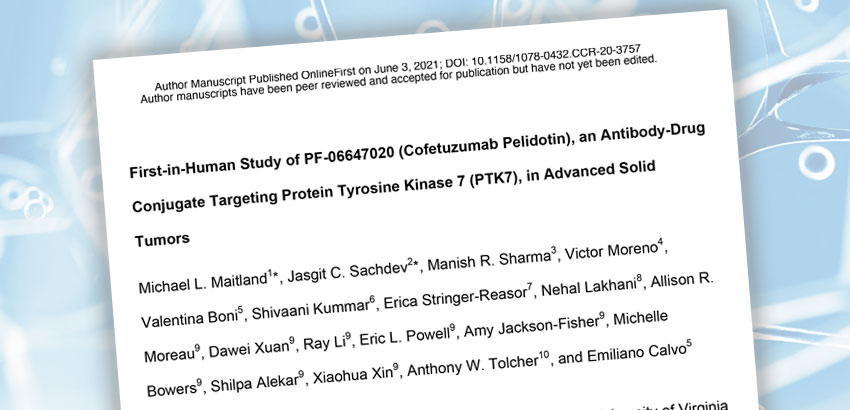In the downloadable original research article sponsored by Pfizer, the digital tissue analysis was performed using the Flagship Biosciences proprietary Image Analysis platform. The article was published in the Journal: Clinical Cancer Research online first on June 3, 2021; DOI: 10.1158/1078-0432.CCR-20-3757.
Translational Relevance:
The transmembrane protein tyrosine kinase 7 (PTK7), involved in Wnt signaling, is overexpressed in multiple tumor types, including advanced non-small-cell lung cancer (NSCLC), ovarian cancer (OvCa), and triple-negative breast cancer (TNBC). Also expressed in tumor-initiating cells (TICs) or cancer stem cells, PTK7 is a tumorassociated target for elimination of cancer cells and TICs. PF-06647020 (cofetuzumab pelidotin) is a humanized, anti-PTK7 antibody─drug conjugate (ADC), designed to deliver an auristatin microtubule inhibitor payload (Aur0101) into target cells. It was shown to induce prolonged tumor regression in patient-derived, tumor xenograft preclinical models. In this first-in-human, dose-finding study, PF-06647020 administered every 2 or 3 weeks demonstrated a tolerable safety profile and preliminary clinical activity in previously treated patients with locally advanced/metastatic, PTK7-positive NSCLC, TNBC, and platinum-resistant OvCa, suggesting the feasibility of this PTK7-targeting approach. Further clinical investigations are ongoing to assess the therapeutic potential of PF06647020/cofetuzumab pelidotin in advanced, PTK7-positive cancers.
Abstract
Purpose: We investigated safety, tolerability, pharmacokinetics, and antitumor activity of the protein tyrosine kinase 7 (PTK7)-targeted, auristatin-based antibody–drug conjugate (ADC) PF-06647020/cofetuzumab pelidotin (NCT02222922).
Experimental Design: Patients received PF-06647020 IV every 3 weeks (Q3W) at 0.2–3.7 mg/kg or Q2W at 2.1–3.2 mg/kg, in sequential dose-escalation, following a modified toxicity probability interval method. In dose expansion, pretreated patients with advanced, platinum-resistant ovarian cancer (OvCa), non-small-cell lung cancer (NSCLC) or triple-negative breast cancer (TNBC) received PF-06647020 2.8 mg/kg Q3W.
Results: The most common, treatment-related adverse events (TRAEs) for PF06647020 administered Q3W were nausea, alopecia, fatigue, headache, neutropenia, and vomiting (45%-25%); 25% of patients had grade ≥ 3 neutropenia. Two patients experienced dose-limiting toxicities (DLTs, grade 3 headache and fatigue) at the highest Q3W dose evaluated. The recommended phase 2 dose was 2.8 mg/kg Q3W. The overall safety profile observed with PF-06647020 administered Q2W was similar to that of the Q3W regimen. Systemic exposure for the ADC and total antibody generally increased in a dose-proportional manner. Antitumor activity was observed in treated patients with overall objective response rates of 27% in OvCa (n = 63), 19% in NSCLC (n = 31) and 21% in TNBC (n = 29). Responders tended to have moderate or high PTK7 tumor expression by immunohistochemistry.
Conclusions: This PTK7-targeted ADC demonstrated therapeutic activity in previously treated patients with OvCa, NSCLC, and TNBC at a dose range of 2.1-3.2 mg/kg, supporting further clinical evaluation to refine dose, schedule, and predictive tissue biomarker testing in patients with advanced malignancies.
Read and download the entire article to learn more.

